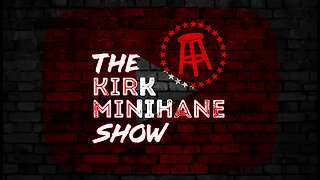Wikipedia Co-Founder Larry Sanger Has Started A Database Of Encyclopaedias To Challenge Wikipedia's Dominance
Wikipedia Co-Founder Larry Sanger Has Started A Database Of Encyclopaedias To Challenge Wikipedia's Dominance
Nov. 24, 2023
Wikipedia has become a bastion of establishment propaganda that no longer even pretends to be neutral on the controversies of the day, and this is very dangerous to society, explained Wikipedia co-founder Larry Sanger on Conversations That Matter with The New American magazine's Alex Newman.
This undermining of neutrality, partly by banning many non-establishment sources, is affecting and angering both the right and left.
About 15 years ago, a scan of IP addresses involved in editing Wikipedia found that an unusually high number came from Langley, Virginia, where the Central Intelligence Agency ("CIA") is headquartered.
"I'm sure it's not just the CIA," he said, noting that humanity was facing "information warfare." "It isn't just spy agencies."
Sanger also offers insights into how humanity can free itself from this narrative control. These include Internet decentralisation and new services he is working on such as the Knowledge Standards Foundation and the Encyclosphere, a universal network of encyclopaedias.
Wikipedia launched with a commitment to neutrality, Sanger said. That means the articles were supposed to be balanced.
Between 2005 and 2015, "the left executed its march through the modern institutions of the internet … and by 2015 Wikipedia articles were much much more biased than they had been in the first years of the project," he explained. "But I don't think it's just a matter of the left, it's the establishment."
The reason why it would be wrong to see this simply as a problem with people on the left of politics influencing Wikipedia is because there are elements of the left that are just as upset with Wikipedia.
One of the problems that Sanger is aware of is that Wikipedia has made it against the rules to use a lot of sources in their articles that run contrary to "the Establishment's" point of view. Wikipedia has a system of colour-coding sources. If a source is coded red, then that source cannot be used in Wikipedia articles. The system has been automated so that if someone tries to link a Wikipedia article to one of the sources coded red, the edit won't be saved.
"But we will not know precisely what has happened until some insiders, probably more than one, emerge that can provide some documentation about what's been going on behind the scenes because I'm very sure there has been a lot," Sanger said.
In 2005, the WikiScanner was introduced. It logged the IP addresses of Wikipedia editors. "It turns out that a lot of them came from Langley, Virginia – the home of the CIA," Sanger said.
"I'm sure it's not just the CIA because the information warfare now is conducted online. And a lot of it has to do now with, essentially, propaganda … Organised systematic attempts to change public opinion in the direction that well-funded or powerful people want it to be changed in. And of course, it's not just spy agencies that want to do that," he said. "There are also powerful corporations and, who knows, probably criminal organisations as well."
As Wikipedia became a more and more popular source of information for the public, it got on the radar of, for example, people involved in public relations and journalists. Sanger thinks that these people made use of Wikipedia's community spirit which was already dominated by the people on the left of politics and made it more left-leaning.
When information is controlled from the top, it is an enormous problem, Sanger told Newman.
In an article he published earlier this month, Sanger explained that Google, Bing, and DuckDuckGo heavily push Wikipedia articles. "Most people don't deliberately choose Wikipedia due to its pristine reputation for objective truth-telling; they just end up there because of its position in search results. Wikipedia is frequently used by generative AI, and so Google's reliance on AI algorithms has if anything made this problem worse. Wikipedia is in a very dominant position," he wrote.
He has argued in a series of blog posts and various alternative media appearances that Wikipedia's centralised power has increasingly been used to push establishment narratives. "Worse, it is now used to silence and discredit competing ideas and people. Its editors hide behind anonymous identities that shield them from liability. So, its articles can be remarkably vicious against disliked targets," Sanger wrote.
The organs of the Establishment are all now online, and their instruments of social control are described as "Big Tech." This includes Google, YouTube, Twitter/X, Facebook, Bing, and others. Wikipedia is another organ of Big Tech information control – a huge one.
Wikipedia's Empire – and How to Build a Rebel Alliance of Knowledge, Larry Sanger, 1 November 2023
By "the Establishment," Sanger means all the varied institutions and the more or less interchangeable people within them that are attacking free speech by taking control of information on Big Tech, decrying supposed misinformation, and pushing the current thing.
In the second half of his interview with Newman, Sanger discussed a solution to the Wikipedia problem – Encyclosphere, He has also written about this in his article.
The Encyclosphere collects all the free encyclopaedia articles on the internet into a series of connected databases, "Well, at least, we're working on [collecting all the articles] because there's a lot of them," he said.
It's possible to search the databases using EncycloSearch and EncycloReader. Currently, EncycloSearch covers about 35 encyclopaedias but it will soon have quite a few more. EncycloReader has fewer.
"If you can help it, you should not be giving Wikipedia.org your traffic … If you must use Wikipedia, you can find the same articles, in their latest versions, on EncycloReader," he wrote.
At the end of his article, Sanger asks for our help:
We are still in the early days of an organised response to the abusive dominance of Wikipedia.
Your help is badly needed. If thousands of us were to start our own encyclopaedia projects – yes, really, small encyclopaedias are now more doable than ever – and if we all start rallying around the Encyclosphere, things will start happening. We'll get harder and harder to ignore.
So, what can we do? I will list some ways and then describe each.
First, write articles, and make them part of the Encyclosphere:
1. Express yourself by writing encyclopaedia articles on your own blog. You can submit them to the Encyclosphere if you want. [See Sanger's article for more details]
2. De-bias Wikipedia articles on Justapedia. [See Sanger's article for more details]
3. Contribute articles on any subject on Citizendium and Enhub. [See Sanger's article for more details]
This is not a waste of time. Generally speaking, your content will show up in search engines, if it's substantive and original. And the advent of the Encyclosphere means your content can live on forever in an organised, searchable fashion.
https://expose-news.com/2023/11/24/database-of-encyclopaedias-vs-wikipedia
-
 LIVE
LIVE
SonnyFaz
24 minutes agoSonny Debates OF Chug Jug Girl LVL 97
390 watching -
 DVR
DVR
The Kirk Minihane Show
3 hours ago420 Show
4531 -
 31:28
31:28
Alexis Wilkins
12 hours agoBetween the Headlines with Alexis Wilkins: Wisconsin Supreme Court, Psaki's Book, Debates, Border
2.1K3 -
 LIVE
LIVE
Right Side Broadcasting Network
12 days agoLIVE REPLAY: President Trump Headlines the 153rd Annual NRA Meeting - 5/18/24
8,612 watching -
 35:50
35:50
TheTapeLibrary
1 day ago $0.02 earnedThe Disturbing True Story of The Amityville Horror
1.6K4 -
 8:13
8:13
Memology 101
1 day ago $0.03 earnedABSOLUTE CHAOS as MTG, AOC & Crockett trade insults during AG Garland Contempt Hearing
2.13K53 -
 11:26
11:26
Blue Siesta ASMR
1 day agoBETWEEN LIFE AND DEATH IN CANCUN
1.43K4 -
 15:36
15:36
Landed Fishing
1 day agoCatching Tarpon with Crab in Boca Grande! The Silver King Capital of the World New Fishing Gear 2024
1.48K2 -
 6:28
6:28
JoBlo Horror Originals
1 day agoWe Remember Roger Corman
967 -
 5:29
5:29
Michael Heaver
1 day agoDutch Finally Make ASTONISHING Decision
1.33K12